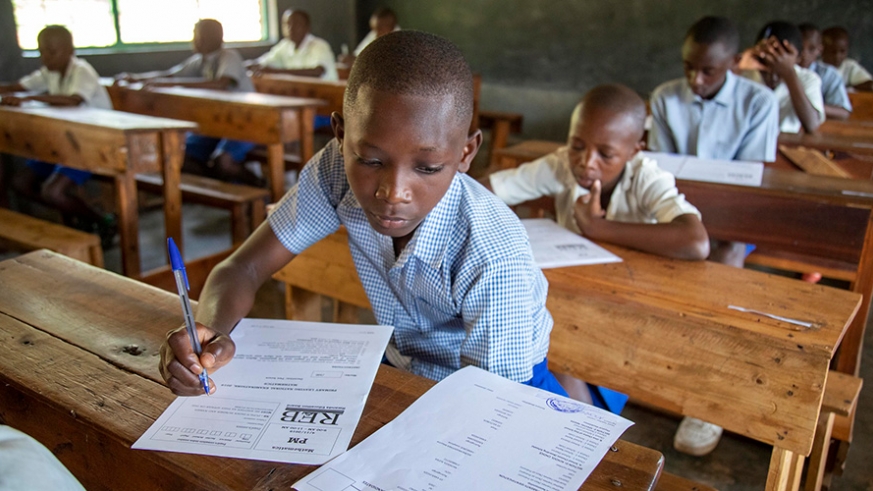A new report by the Education Policy Review Commission (EPRC) has recommended the abolition of the Primary Leaving Examinations (PLE) and the automatic promotion of learners from primary school. The report also proposes reducing the duration of nursery education from three years to one and shortening the primary education cycle from seven years to six. The report, titled Education for Values, Innovation, and Transformation, was released in January 2025 and aims to reform Uganda’s education system by emphasizing practical skills over theoretical learning.
Officials from the Ministry of Education and Sports (MoES) have acknowledged receipt of the report but have yet to comment on its key recommendations. Dr. Jane Egau Okou, the ministry’s undersecretary, stated that they had just received the report and needed time to review its contents before making an official statement. Meanwhile, education stakeholders have expressed mixed reactions to the proposals. Some argue that scrapping PLE and implementing automatic promotion would lower academic standards and eliminate healthy competition, while others support the move as a step toward reducing the commercialization of education.
The EPRC report proposes a restructuring of Uganda’s education system that would reduce the total number of years a child spends in pre-primary, primary, and secondary education from 16 to 13. Under this proposal, an integrated 11-year Universal Basic Education (UBE) system would be introduced, consisting of one year of pre-primary, six years of primary, and four years of lower secondary education. This would be followed by two years of Advanced Level education. Additionally, the report recommends replacing the PLE with school-based continuous assessments to ensure that all learners progress automatically to secondary school and complete basic education. The first national assessment under this new structure would be conducted at the end of 13 years, and successful learners would be awarded a Uganda Certificate of Basic Education and Training (UCBET) before advancing to Advanced Level education. A second national assessment at the end of Advanced Level would lead to the Uganda Certificate of Advanced Education and Training (UCAET).
The commission argues that this system would provide a more structured and competency-based evaluation approach, ensuring that learners acquire essential skills at each stage of their education. The report highlights that Uganda’s current education model, which consists of Primary, Lower Secondary, Upper Secondary, and Tertiary education levels, is more prolonged compared to neighboring countries such as Tanzania and Ethiopia. These countries have integrated pre-primary education into their public systems to address challenges such as low literacy, cognitive development, and class repetition. The commission believes that Uganda should adopt a similar strategy by reducing nursery education to one year and setting the official admission age at five. This, they argue, would prevent parents from enrolling toddlers in school too early. The proposed education structure aims to integrate academic and vocational training, enhancing workforce readiness and aligning with regional and international standards.
The report describes the PLE as a “terminal and high-stakes examination” that has significantly hindered student transition rates into lower secondary school. According to the findings, transition rates have declined over time, from 66 percent in 2009 to 60.6 percent in 2017, leaving nearly 40 percent of students unable to proceed to secondary education. The commission argues that this system has disproportionately affected learners from disadvantaged backgrounds and has turned primary education into a rigidly competitive process rather than a foundation for lifelong learning.
Education experts remain divided on the proposal to abolish PLE. Filbert Baguma, Secretary-General of the Uganda National Teachers Association (UNATU), welcomed the recommendation, arguing that eliminating PLE would reduce the commercialization of education, where schools prioritize rankings over holistic learning. He criticized the current system for branding students who do not perform highly as failures, which he believes is detrimental to their self-esteem and future potential. Baguma further emphasized that education should not be about ranking learners like businesses advertising profits but should instead focus on developing well-rounded individuals.
On the other hand, Hasadu Kirabira, Chairperson of the National Private Education Institutions Association (NPEIA), opposed the proposal, stating that PLE serves as an essential benchmark for assessing academic performance. He argued that removing PLE would make learning less effective because there would be no standardized way to measure student progress. He further pointed out that parents rely on PLE results as an objective measure of their children’s academic abilities and that eliminating the exam could lead to a decline in overall academic performance.
Despite disagreements over PLE, most stakeholders support the proposal to shorten nursery education. Baguma advocated for government intervention in early childhood education, arguing that private institutions have exploited parents by charging exorbitant fees. He noted that some nursery schools charge more than universities, with some parents paying as much as UGX 2 million per term for pre-primary education. He believes that reducing the number of nursery years will lessen this financial burden and improve efficiency. Additionally, he criticized the practice of young children being forced to wake up at 5 a.m. to attend school, calling it a form of punishment that negatively affects their mental and physical well-being.
The EPRC report has sparked a national debate on the future of Uganda’s education system. While some stakeholders welcome the reforms, others remain skeptical about their impact on academic standards and learner motivation. The Ministry of Education and Sports is expected to review the recommendations before making a final decision on their implementation. If adopted, these proposals could significantly transform Uganda’s education landscape, shifting from high-stakes exams to a competency-based, skills-oriented approach. However, the challenge remains in balancing innovation with academic rigor to ensure students receive a quality education that prepares them for future careers





